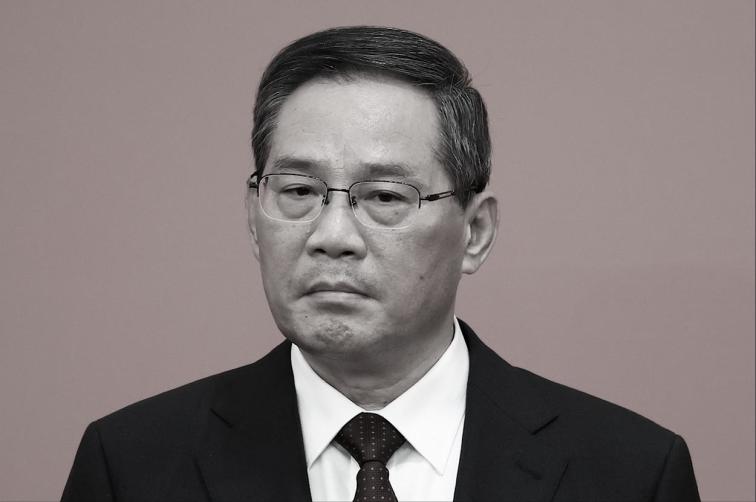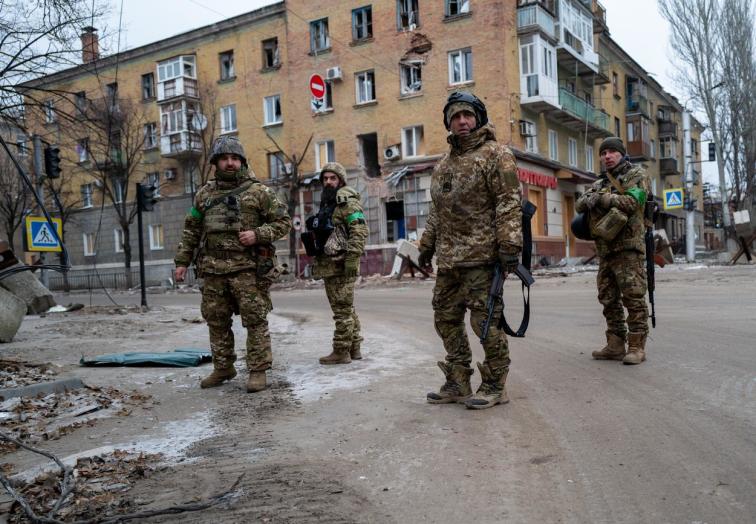March 10, 2025, Beijing Great Hall of the People—A security guard stands at the entrance before the closing ceremony of the Chinese People's Political Consultative Conference. (WANG ZHAO/AFP via Getty Images)
[People News] Recently, international media have turned their attention to the Chinese Communist Party's political landscape, examining shifts in the power dynamics of Beijing's top leadership and analysing whether Xi Jinping's authority is being undermined. An article published by the French newspaper 'Le Figaro' has revealed unusual signs of tension within the CCP, attributed to economic and political challenges, suggesting that Xi Jinping's power is waning and that he may be planning a gradual exit from leadership.
According to Radio France, the article in 'Le Figaro' appeared in the 'Opinion' section and was authored by senior French journalist Pierre Antoine Donnet.
The author highlights a rare incident that has recently occurred within the CCP's political sphere, which has led to widespread speculation regarding shifts in the power structure of the CCP's upper echelons. This rare incident refers to the Politburo meeting that took place on June 30.
As reported by Xinhua News Agency, although the meeting was chaired by CCP leader Xi Jinping, the content of the report deviated from previous norms, omitting references to 'the Party Central Committee with Xi Jinping at its core' and 'Xi Jinping Thought as guidance.'
The Politburo meeting reviewed the 'Regulations on the Work of the Party Central Committee's Decision-Making and Coordination Mechanism' and asserted that this mechanism is a crucial institutional arrangement for enhancing the CCP Central Committee's 'unified leadership over significant work' and for advancing the implementation of 'major tasks.' The meeting also emphasized that this mechanism should 'focus on major issues, discuss significant matters, and address key tasks,' overseeing and coordinating 'major work,' among other responsibilities.
The article in 'Echo Report' reported that '23 out of the 24 members of the Politburo convened a closed-door meeting at the Great Hall of the People, urging Xi Jinping to consider retirement due to the country's economic and social challenges, which has sparked significant controversy.'
At that time, many observers believed that Xi Jinping's authority was under serious threat, marking a significant indication that he had been effectively sidelined.
The analysis in 'Echo Report' noted that this clearly signifies a shift in the country's governance model. However, due to the regime's lack of transparency, the exact impact on Xi Jinping remains uncertain. Analysts suggest that these new regulations reflect a worsening public perception of Xi Jinping.
There has been a widespread belief that the final blow to Xi Jinping's leadership could be attributed to China's severe economic downturn.
The article highlighted that, amid a prolonged economic slump, soaring youth unemployment, and a drastic decline in public confidence, Xi Jinping's authoritarian governance style has led to growing discontent among the upper echelons.
Nevertheless, the article also pointed out that there are currently two starkly contrasting analytical views. One perspective posits that Xi Jinping is under attack from within the party and is at the heart of a power struggle; the other, conversely, argues that he remains in power but is encountering challenges within the regime. Despite their differences, both analyses share a commonality: while Xi Jinping is unlikely to relinquish power in the immediate future, they both suggest that unprecedented tensions may be brewing within the Communist Party.
Additionally, the article noted an important point: Xi Jinping himself chaired this meeting, which suggests that he may be voluntarily considering a gradual delegation of power.
External perspectives suggest that, in line with the conventions of the Chinese Communist Party (CCP), the individual leading meetings is not necessarily the highest authority. Those who may be pulling the strings behind the scenes could include CCP elders or military leader Zhang Youxia.
Professor Ming Juzheng from the Department of Political Science at National Taiwan University notes that it is typical for Xi Jinping to lead the meeting; otherwise, his regime 'would come to an end.'
An article from the 'Echo Report' also references analyses from several experts, indicating that health issues are likely a contributing factor to Xi Jinping's intention to 'delegate power.' At the age of 72, Xi Jinping has found it increasingly challenging to balance physical stamina with political pressures, prompting him to consider 'delegating power.'
Furthermore, the 'Echo Report' highlights that Xi Jinping has been actively purging high-ranking officials within the military and has conducted multiple rounds of 'cleansing,' which has led to a degree of political instability within the armed forces.
Following the conclusion of the 20th National Congress of the CCP in October 2022, the Central Military Commission originally had 7 members, but now only 4 remain: Military Commission Chairman Xi Jinping, Vice Chairman Zhang Youxia, Central Military Commission member and Chief of the Joint Staff Liu Zhenli, and Central Military Commission member and Secretary of the Military Discipline Inspection Commission Zhang Shengmin.
Professor Ming asserts that it is now quite clear that internal conflicts within the CCP are highly intense. There are two main reasons: first, there are individuals who strongly oppose Xi Jinping, and second, Xi Jinping's health is deteriorating.
Observers note that whether Xi Jinping chooses to delegate power or step down, the key point of observation will be this year's Fourth Plenary Session. Nevertheless, regardless of the outcome, the entire CCP will likely strive to maintain unity and harmony within the party until a significant breaking point is reached. Until that day arrives, the public may continue to see Xi Jinping presiding over various meetings and issuing directives. △










News magazine bootstrap themes!
I like this themes, fast loading and look profesional
Thank you Carlos!
You're welcome!
Please support me with give positive rating!
Yes Sure!